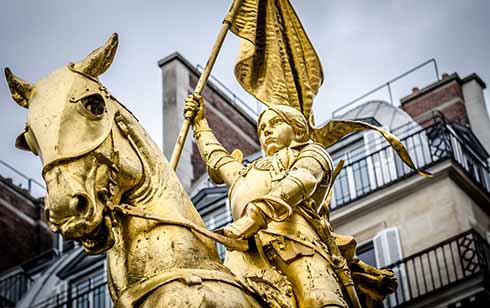 Dear Charlotte and Ella,
Dear Charlotte and Ella,
‘It took six thousand years to produce her; her like will not be seen in the earth again in fifty thousand’.
– Personal Recollections of Joan of Arc, by Mark Twain
I rarely cry when reading a book. Recently, however, I wept, not just once but multiple times while reading a historical novel about the life and martyrdom of St Joan of Arc. The author may surprise you – the famous American humorist Mark Twain. Although reared in a Protestant community, which held hostile views of the Catholic Church, Twain spent much of his life enthralled with Joan of Arc, after as a child he found a lost page of her biography.
Born Samuel Clemens in 1835, Twain was raised in the midwest state of Missouri, and as a Presbyterian, Twain’s devotion to Joan of Arc was unusual. Although confusing to his fans for its reverence and lack of humour, Twain considered The Personal Recollections of Joan of Arc to be his most outstanding achievement, spending 10 years researching and two years writing the book.
One of his lesser-known works, it was first published in Harper’s magazine as short pieces under the pseudonym The Sieur Louis De Conte (Joan of Arc’s fictional page and secretary). When published as a novel, Twain dedicated the book to his wife for their 25th anniversary and proclaimed, ‘I like the Joan of Arc best of all my books, and it is the best of all my books.’
JOAN THE MAID
Once you dig beyond the surface of her story, it is no wonder why Mark Twain spent years researching Joan of Arc before he completed his novel on the ‘Maid of Orleans’, claiming he did not care if it sold as he wrote it out of devotion.
There is just too much to say about Joan. Born in 1412 in Domremy, France, Joan was 13 when she first heard a voice in her father’s garden accompanied by a light. Joan eventually identified the voice as St Michael the Archangel, and later, St Margaret and St Catherine would join, becoming what Joan called ‘her voices’. According to the transcripts from her trial, in the beginning her voices’ guidance only taught her to grow in piety and strengthen her faith in God. Many witness accounts validated that Joan’s faith and acts of charity made her stand out against her peers.
Later, the voices told her of God’s plan for her life and France. According to transcripts from her trial in Rouen, when her ‘voices’ first told her the mission she was called to, Joan responded, ‘And me I answered it, that I was a poor girl who knew not how to ride nor lead in war’. But, the voices did not relent and repeated the divine request for Joan to lead France to victory, which they insisted was the will of God.
Joan’s mission was to liberate the city of Orleans and crown the dauphin (the heir to the French crown), later Charles VII. Within six months of leaving her village, Joan met the demand of her heavenly Father. With no military training, out of Joan’s 13 military actions, nine were successful. In addition to these named feats, she is also credited with improving the piety of the soldiers in the field with her, requesting that no soldier swear or gamble and demanding all go to confession before each battle. She offered strategic military advice that turned the Hundred Years War in the favour of France, restored French nationalism, and changed French history forever. Joan credited all her victories to God and the Cross was at the forefront of all her actions. Burned at the stake for heresy, in 1431, Joan of Arc asked the Dominican friar, who accompanied her in her last moments, ‘Hold the cross high so I may see it through the flames!’ As the fire consumed her, she repeated the name of ‘Jesus’ until she was unconscious.
TWAIN’S DEVOTION TO JOAN
In 1895, while in Paris finishing The Personal Recollections of Joan of Arc, Twain wrote in a letter, ‘I have never done any work before that cost so much thinking and weighing and measuring and cramming or so much cautious and painstaking execution’.
The trial transcripts offer insights into the vocation, and faith of an illiterate peasant girl, who God called to save France. In an essay published in Harper’s, Twain emphasises how Joan’s trial transcripts given under oath offer us a unique perspective on the Maid of Orleans. He writes, ‘It gives us a vivid picture of a career and a personality of so extraordinary a character that we are helped to accept them as actualities by the very fact that both are beyond the inventive reach of fiction’.
Joan of Arc’s impact on the history of France is complicated, but undeniable, and some may argue miraculous. In the same article, Twain marvels at ‘the wonderful child’. He says, ‘All the rules fail in this girl’s case. In the world’s history she stands alone – quite alone.’
Twain believed to understand the treasure of Joan of Arc one must weigh her youth, sex, lack of education, peasant background, ‘and the obstructing conditions under which she exploited her high gifts and made her conquests in the field and before the courts that tried her for her life – she is easily and by far the most extraordinary person the human race has ever produced’.
As a Protestant, Twain is able to make such a claim. As Catholics, we would only reserve such a position for Our Lady. But, we can agree Joan of Arc was more than extraordinary. In 1909, a year before Twain died, Joan of Arc was beatified by Pope Pius X and in 1920 canonised by Pope Benedict XV. With the canonisation, St Joan of Arc’s place in Catholic and European history had been rightly corrected.
JOAN OF ARC
c. 1412–30 May 1431
Feast day: 30 May
Patron: France